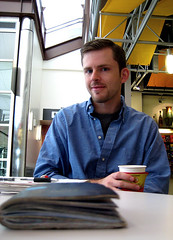A favorite client of mine wrote the other day asking about my thoughts on showing vulnerability in business. She’d been reading a ebook by Lissa Rankin called, “How to Change the World.” In it, Rankin says,
“Speak your truth. The more you allow yourself to be vulnerable, the more you’ll discover the voice of your truth, raring to be heard. Once you get over the fear of rejection that accompanies being vulnerable, you’ll find you have much more to say—and you’ll find a whole boatload of people who are dying to listen.”
I very much agree with this.
But how far does it go?
At the same time, my client and I have had exchanges over the years about how far to go — do we air our dirty laundry in public? Are we being disingenuous if we leave things out? Are there entrepreneurs out there who just go too far and give too much information?
My client also asked a great question, “If I’m trying to decide what level of vulnerability I’m going to show my audience, does that defeat the purpose of it?”
Be real
I think it’s incredibly important to be real — that’s the only way we find our true voice, especially in writing and speaking.
It’s okay to be private too
And, as a sensitive person, it doesn’t work for me to share deeply personal information in public in the name of being authentic and transparent. I need and want to maintain a degree of privacy and personal space. On the other hand, I want you to know me, so you know what you get when you work with me. I agree with Lissa Rankin that the way to find your audience is by speaking your truth and being visible and public about what matters to you.
Where does this leave us?
So is it a question of degree?
Or timing?
Does it mean ALL the truth?
My solution
My solution is to write raw, first. When I’m ready to share something, I core-dump the messy truth with the aim of finding and sharing a message of hope within it. It’s a cathartic process often — I learn just as much through the writing of my thoughts as (I hope) you do from my sharing of them.
I also think it’s a question of timing. If I share the despair and pain I’m in with my audience while I’m going through it, it’s like watching a train wreck. If I share it with you after the fact, and what I’ve gained from my lessons and experiences, we all benefit.
Sometimes I’m able to hold the broader perspective while I’m going through something. If that’s true, I’ll share it at the time it’s happening. If not, I’ll wait (someday you’ll see some work from me around the early days of parenting as an HSP, but not yet. *Grin*)
Bottom line
The bottom line is:
- I don’t go into detail about personal things that are no one’s business but my own — and I don’t think that means I’m not being real, rather being private, and,
- I don’t go into detail about vulnerable things when I’m in the middle of it, unless I feel like I can share it in a way that benefits me and others.
This is the path I’ve found that works for me so far.
Your turn
What do you think? What works for you in this area? I’d love to hear from you in the comments.
Warmly,

~> October 4th. My next Life Purpose Breakthrough Group. SOLD OUT. http://LifePurposeBreakthrough.com
~> October 25th. Register by October 25th for the next 4-week session of my “Just Do The Writing” Accountability Circle (starts October 29th). Looking to feel passionate again about your writing? You must write to get there: http://JustDoTheWriting.com
![]()
~> Ongoing. Working on rewriting my script, Progeny, with my mentor Chris Soth after finishing the ProSeries.*
~> Sacred writing time. My schedule is in flux right now but I’m writing regularly nonetheless.
~> Reading: Harry Potter & the Deathly Hallows with my son — so close to finishing now! I think we’re going to read Eragon next. Or maybe Narnia, or The Belgariad. I can’t wait. I’m deeply enthralled by Homeland, finally saw the finale of Weeds (weird), and I’m so happy Castle is back on the air. *Grin*
* Affiliate link

 Chris Guillebeau, author of
Chris Guillebeau, author of 
